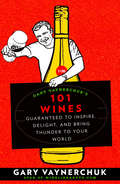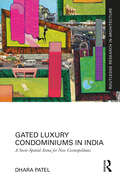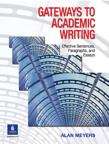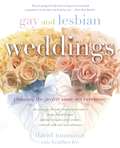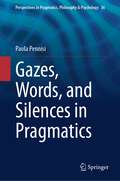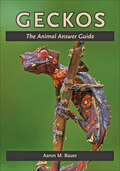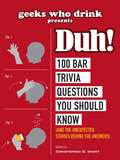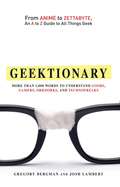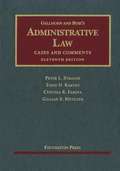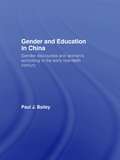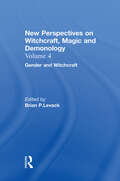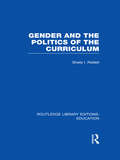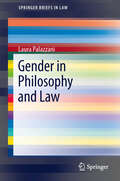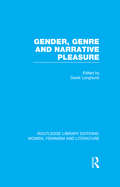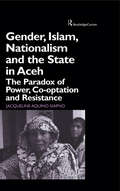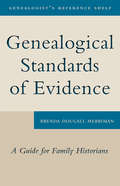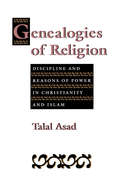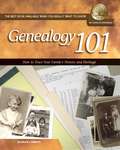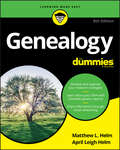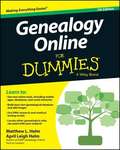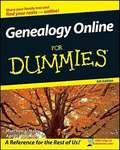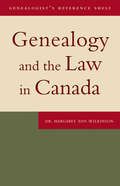- Table View
- List View
Gary Vaynerchuk's 101 Wines: Guaranteed to Inspire, Delight, and Bring Thunder to Your World
by Gary VaynerchukMillions have logged onto Gary Vaynerchuk's Wine Library TV—watching him boldly and unconventionally rate hundreds of wines. Viewers are attracted to his youthful energy, unique voice, and often outrageous descriptions. Now, in Gary Vaynerchuk's 101 Wines, Vaynerchuk reveals his first ranked list of the most exciting and tantalizing spirits he has sampled while traveling the globe. Deeming himself "the wine guy for the average Joe," Vaynerchuk avoids the pomposity of traditional educators. Unlike wine guides that lack animation and lecture rather than inspire, 101 Wines shows you how to develop the necessary go-drink-wine attitude. Vaynerchuk encourages you to trust your own palate—stressing that your love of a certain wine makes it good regardless of what the experts or the price on the bottle say. Vaynerchuk's recommendations span a wide range of prices, nations, grapes, and styles—allowing everyone from novices to connoisseurs to expand their wine horizons. Unlock the secret to why Vaynerchuk labels wines "From Ruins to Riches," "Red with Fish," and "Not Your Father's Spumante." Discover wines that taste like ones 10 times their price. Read as Vaynerchuk illuminates his top choices with vivid terminology such as "Bring the Thunder" and "Riding the Rainbow." Demystify conventions that once limited your wine-tasting desires. Journey through wine styles and break down barriers with his technical notes and stories behind the vintage. Smile as you realize you too can become a wine aficionado. With your newfound knowledge, you will out-entertain and enlighten your friends, host extraordinary parties and treat your taste buds to an exhilarating ride. So if you are ready to become a "Vayniac"—one devoted to selecting wines based on Vaynerchuk's innovative principles—grab that corkscrew because a wine sampling adventure like no other awaits.
Gas Tungsten Arc Welding (Welding Process Training Series, Topic #7)
by Miller Electric Mfg. Co. Training DepartmentThe Gas Tungsten Arc Welding Publication describes the capabilities of today's advanced AC welding power supplies such as the Dynasty® 350 and the many adjustments available on such a machine. Some of the topics discussed are Alternating Current, Frequency, AC Wave Shapes, Polarity, Arc Rectification, Balanced and Unbalanced Waveforms, Adjustable Frequency, Independent Current Control, Pulsed GTAW, and much more.
Gated Luxury Condominiums in India: A Socio-Spatial Arena for New Cosmopolitans (Routledge Research in Architecture)
by Dhara PatelGated Luxury Condominiums in India: A Socio-Spatial Arena for New Cosmopolitans critically examines gated luxury condominiums in contemporary India, exploring their role in shaping elite power and identity within the framework of neoliberalism. It delves into the spatial structure, perception and post-occupancy experience of these enclaves, offering valuable insights into India's urban development.This book convincingly elucidates the complex socio-spatial transformations underway in India, inviting readers to understand the depth and breadth of these changes, particularly within the rapidly expanding middle and upper-middle classes. It adopts a robust multi-disciplinary approach, combining methodologies such as spatial ethnography, threshold mapping, qualitative interviews and discourse analysis. Focused on the architectural typology of luxury condominiums, the study serves as a lens for broader social transformations grounded in case studies from Mumbai and Pune. Through a meticulous dissection of the lived experiences of various categories of users – owners, visitors and service staff – the book unveils the complex socio-spatial hierarchies perpetuated within these enclaves. Drawing on theories of cosmopolitanism and postcolonial critiques, the monograph makes a significant scholarly contribution to the disciplines of architecture and the built environment. It fills a gap in the existing literature on modern domesticity in India, offering original research that highlights how architecture is instrumental in socially divisive practices of elite formation.It will appeal to scholars, researchers and students across disciplines like architecture, landscape design, spatial sociology, urban studies and area studies, focusing on India and South Asia. It is particularly compelling for those interested in the sociocultural dynamics of the middle class, encompassing themes such as domesticity, material culture and spatial politics within the context of Indian condominiums.
Gateways to Academic Writing: Effective Sentences, Paragraphs, and Essays
by Alan MeyersGateways to Academic Writing: Effective Sentences, Paragraphs, and Essays, by Alan Meyers, provides a fully integrated program of writing instruction for high-intermediate to advanced students of English. The book's four units give students the tools they need to improve their academic writing. Unit I introduces the writing process, from exploring ideas, organizing, and drafting to revising, editing, and proofreading. Unit II examines the ten modes of writing, including narration, all forms of exposition, persuasion, and summary and response. Unit III presents key terminology, sentence structures, and verb tenses and forms. Unit IV gives students extensive editing practice, including Editing for Mastery exercises.
Gay and Lesbian Weddings: Planning the Perfect Same-Sex Ceremony
by David ToussaintComprehensive, fresh, and funny, Gay and Lesbian Weddings covers everything you need to know to plan the wedding of your dreams. Unlike other wedding planners, this one tackles the issues your heterosexual friends never had to consider. For instance, do you come out to Aunt Gloria before she receives the invitation and the shock of her life? Which father of the bride pays for a lesbian wedding? Who walks down the aisle first? Is it possible for members of the wedding party to be happy with what you force them to wear? (Okay, this is a universal problem.) Step-by-step and down-to-earth, Gay and Lesbian Weddings includes invaluable advice on* the changing laws regarding gay marriage in the United States and abroad; the differences among domestic partnerships, civil unions, and marriage* budget concerns: choosing your ideal wedding size and style* finding gay-friendly printers, photographers, gift registries, caterers, florists (actually, if you find a gay-hostile florist, we'd love to hear about it)* ethnic, theme, and destination weddings* keeping the honey in the honeymoon* sex--including how to keep the heat after the wedding night, as well as the facts on fidelity (can the two be linked?)Plus: a handy Wedding Countdown Calendar, website resources, and true stories from same-sex couples who've gotten hitched without a hitchGay and Lesbian Weddings gives you straight talk (so to speak) with equal parts information, flair, and fabulousness!From the Trade Paperback edition.
Gazes, Words, and Silences in Pragmatics (Perspectives in Pragmatics, Philosophy & Psychology #36)
by Paola PennisiThis book describes the role of eye contact in human communication by investigating the relationship between the eye gaze and the development of language and pragmatic skills. The author reveals that although the need for eye contact is an innate human characteristic, neurodevelopmental disorders can have adverse outcomes and delays in language and pragmatic skills. A comparative approach compares childhood disorders that affect pragmatics in animal species that are phylogenetically related to humans with those species that are not. This text appeals to students and researchers working in pragmatics and the philosophy of language.
Geckos: The Animal Answer Guide (The Animal Answer Guides: Q&A for the Curious Naturalist)
by Aaron M. BauerEverything a student, naturalist, or curious observer wants to know about the biology and diversity of geckos.Q: How do geckos walk across ceilings? A: Millions of hair-like setae on each foot.Q: Where do geckos come from? A: Throughout the world. Usually where it’s warm.Q: How many species of geckos are there? A: Close to 1,500 and counting!Q: What do they eat? A: Insects mostly. Discover the biology, natural history, and diversity of geckos—the acrobatic little lizards made famous by a car insurance ad campaign. Lizard biologist and gecko expert Aaron Bauer answers deceptively simple questions with surprising and little-known facts. Readers can explore color photographs that reveal the natural wonder and beauty of the gecko form and are further informed by images of how geckos live in their natural habitats. Although written for nonexperts, Geckos also provides a carefully selected bibliography and a new list of all known species that will be of interest to herpetologists. Anyone who owns a gecko, has seen them in the wild, or has wondered about them will appreciate this gem of a book.
Geeks Who Drink Presents: 100 Bar Trivia Questions You Should Know (And the Unexpected Stories Behind the Answers)
by Christopher D. Short100 hilarious essays, based on blindingly obvious questions, from the creators of Geeks Who Drink—led by six-time Jeopardy! champion, Christopher D. Short.The best trivia questions are usually the ones that are right on the tip of your tongue—so obvious that you may not know the answer offhand, but you should. In Duh, America’s foremost masters of pub quiz, Geeks Who Drink, will take trivia lovers on a voyage through 100 of our face-palmiest questions. Along the way, we’ll explore the blind hills and corners that make random knowledge so much fun. In hilarious, informative, bite-size essays, we’ll explore such not-really-mysteries as: -How many stars are on the Texas state flag? -Odlaw is the nemesis of what kid book character? -What’s the last word in the King James Bible? Even if you already know the “what”—and you might not!—we’ll fill in the “why.” And the when, where, and how. By the end you may feel dumber, but you’ll be smarter. We almost guarantee it! By the way, that would be one (lone) star, Waldo, and “Amen.” Duh!
Geektionary
by Gregory Bergman Josh Lambert"The last WoW module was clunky and a bit slow on my rig but it had a great toolset for building adventures for my avatar. Now I'm at sixtieth level! Awesome!"Whether it's about science fiction, Star Trek, sports, comics, or computers, geekspeak is full of mysterious words and phrases. But now there's an easy way to understand what it's all about.With this book you can dork out with the best of 'em. Here are more than 1,000 words and their definitions, including such gems as: LARPRed ShirtWilhelm ScreamXenomorphMunchkin*So don't worry if you don't know what a midochlorian is or what to do with a proton pack. With this book, you'll never be confused again.*Which doesn't mean what you think it means, unless you're a fan of roleplaying games.
Geektionary: From Anime to Zettabyte, An A to Z Guide to All Things Geek
by Gregory Bergman Josh LambertWhether it's about science fiction, Star Trek, sports, comics, or computers, geekspeak is full of mysterious words and phrases. But now there's an easy way to understand what it's all about.With this book you can dork out with the best of 'em. Here are more than 1,000 words and their definitions, including such gems as:LARP, Red Shirt, Wilhelm Scream, Xenomorph, Munchkin*So don't worry if you don't know what a midochlorian is or what to do with a proton pack. With this book, you'll never be confused again.Which doesn't mean what you think it means, unless you're a fan of roleplaying games.
Gellhorn and Byse's Administrative Law: Cases and Comments (11th Edition)
by Peter L. Strauss Todd RakoffThis authoritative casebook presents a comprehensive treatment of the doctrinal basis of administrative law that students need to know to practice competently and also a substantial development of the scholarly literature that has, from many perspectives, critiqued the existing law. The 11th edition continues the tradition of offering instructors a rich theoretical, historical and political context for the cases. At the same time, recognizing changing pedagogical demand, the book offers a leaner presentation of many topics and more cues for helping students navigate the book.
Gender Justice And Feminist Jurisprudence
by Dr Ishita ChatterjeeThis book is a need of a book on Gender Justice and Feminist Jurisprudence to deal with the subject on women rights. This book is a humble attempt to comply that need. The basic objective of this book is to provide the student, teachers and researchers topics on women related issues, their rights and obligations.
Gender and Education in China: Gender Discourses and Women's Schooling in the Early Twentieth Century (Routledge Contemporary China Series #Vol. 15)
by Paul J. BaileyGender and Education in China analyzes the significance, impact and nature of women's public education in China from its beginnings at the turn of the twentieth century. Educational change was an integral aspect of the early twentieth century state-building and modernizing reforms implemented by the Qing dynasty as a means of strengthening the foundations of dynastic rule and reinvigorating China's economy and society to ward off the threat of foreign imperialism. A significant feature of educational change during this period was the emergence of official and non-official schools for girls. Using primary evidence such as official documents, newspapers and journals, Paul Bailey analyzes the different rationales for women's education provided by officials, educators and reformers, and charts the course and practice of women's education describing how young women responded to the educational opportunities made available to them. Demonstrating how the representation of women and assumptions concerning their role in the household, society and polity underpinned subsequent gender discourses throughout the rest of the century, Gender and Education in China will appeal to students and scholars of Chinese history, gender studies, women's studies as well as an interest in the history of education.
Gender and Witchcraft: New Perspectives on Witchcraft, Magic, and Demonology (Witchcraft, Magic, And Demonology Ser.)
by Brian P. LevackWitchcraft and magical beliefs have captivated historians and artists for millennia, and stimulated an extraordinary amount of research among scholars in a wide range of disciplines. This new collection, from the editor of the highly acclaimed 1992 set, Articles on Witchcraft, Magic, and Demonology, extends the earlier volumes by bringing together the most important articles of the past twenty years and covering the profound changes in scholarly perspective over the past two decades. Featuring thematically organized papers from a broad spectrum of publications, the volumes in this set encompass the key issues and approaches to witchcraft research in fields such as gender studies, anthropology, sociology, literature, history, psychology, and law. This new collection provides students and researchers with an invaluable resource, comprising the most important and influential discussions on this topic. A useful introductory essay written by the editor precedes each volume.
Gender and the Politics of the Curriculum (Routledge Library Editions: Education)
by Sheila RiddellThis book uses detailed case studies of two secondary schools to examine the relationship between curriculum choice and gender identity among fourteen-year-old pupils making their first choices about what subjects to pursue at exam level. It reveals a two way process. Pupils’ decisions on what subject to take are influenced by how they perceive themselves in gender terms, and the curriculum once chosen reinforces their sense of gender divisions. The author looks at the influences on pupils at this stage in their lives from peers, family and the labour market as well as from teachers. She argues that the belief in freedom of choice and school neutrality espoused by many teachers can become an important factor in the reproduction of gender divisions, and that unless the introduction of the national curriculum is accompanied by systematic efforts to eradicate sexism from the hidden curriculum it will fail in its aim of creating greater equality of educational opportunity among the sexes.
Gender in Philosophy and Law
by Laura PalazzaniThis book is an introductory systematic framework in the complex and interdisciplinary sex/gender debate, focusing on philosophy of law.The volume analyses the different theories that have dealt with the gender category, highlighting the conceptual premises and the arguments of the most influential theories in the debate, which have had repercussions on the field of the ethical and juridical debate (with reference to intersexuality, transsexualism, transgender, homosexuality). The aim is to offer a sort of conceptual orientation in the complexity of the debate, in an effort to identify the various aspects and development processes of the theories, so as to highlight the conceptual elements of the theorisations to grasp the problem areas within them. It is therefore an overall synthetic and also explicative analysis, but not only explicative: the aim is to outline the arguments supporting the different theories and the counter-arguments too, for the purpose of proposing categories to weigh up the elements and to take one's own critical stance, with a methodological style that is neither descriptive nor prescriptive, but critical.
Gender, Genre & Narrative Pleasure (Routledge Library Editions: Women, Feminism and Literature #Vol. 1)
by Derek LonghurstRecent years have witnessed important new initiatives in the study of popular fictional modes of writing. At one time the field could have been described with reasonable accuracy by two traditions: one that analyzed the production and distribution of popular fiction as commodities; and one whose proponents regarded popular fiction as the negative which offered definition to the exposure of the positive - the ‘great’ canonic literary tradition. Generally, then, popular fictions were to be ‘evaluated’ according to the institutionalized norms which had been established as common sense practice around literary studies. The decade of the 1970s, however ushered in a bewildering range of theoretical debates - a crucial gain was establishment of interdisciplinary courses in communication, cultural and media studies, providing a network of contexts within which serious analysis could evolve and progress. Responding to a fundamental challenge from feminism, a primary objective of this book is to propose that all narrative and its reading are intrinsically inflected by sexual politics. Various approaches represented here demonstrate problems of confronting the gendered pleasures of reading. Questions about self, sexuality and identity within specific historical formations are raised. The objective is to frame, describe and unearth the notion of ‘men as readers’ as a project rather than as the usual, unquestioned normative procedure. Drawing eclectically upon Marxist, psychoanalytic and discourse theory, the essays set out readings of popular texts and genres – the Western, the sentimental novel, detective and crime fiction, political thrillers and horror and science fiction – in the interest of provoking other readers to see the critical study of popular fiction as unthinkable without gender as a central concern.
Gender, Islam, Nationalism and the State in Aceh: The Paradox of Power, Co-optation and Resistance
by Jaqueline Aquino SiapnoThis book sets out to open up the space for interpretation of history and politics in Aceh which is now in a state of armed rebellion against the Indonesian government. It lays out a groundwork for analysing how female agency is constituted in Aceh, in a complex interplay of indigenous matrifocality, Islamic belief and practices, state terror, and political violence. Analysts of the current conflict in Aceh have tended to focus on present events. Siapno provides a historical analysis of power, co-optation, and resistance in Aceh and links it to broader comparative studies of gender, Islam, and the state in Muslim communities throughout the world.
Genealogical Standards of Evidence: A Guide for Family Historians
by Brenda Dougall MerrimanGenealogical evidence is the information that allows us to identify an individual, an event in his or her life, or the relationship between individuals. In such a process, we often hear or use words such as evidence, proof, or documentation. Brenda Dougall Merriman takes readers through the genealogical process of research and identification, along the way examining how the genealogical community has developed standards of evidence and documentation, what those standards are, and how they can be applied. As a supplement to courses, workshops, and seminars, this book provides both an in-depth and inexpensive reference, perfect for compiling and checking research notes.
Genealogies of Religion: Discipline and Reasons of Power in Christianity and Islam
by Talal AsadIn Geneologies of Religion, Talal Asad explores how religion as a historical category emerged in the West and has come to be applied as a universal concept. The idea that religion has undergone a radical change since the Christian Reformation—from totalitarian and socially repressive to private and relatively benign—is a familiar part of the story of secularization. It is often invokved to explain and justify the liberal politics and world view of modernity. And it leads to the view that "politicized religions" threaten both reason and liberty. Asad's essays explore and question all these assumptions. He argues that "religion" is a construction of European modernity, a construction that authorizes—for Westerners and non-Westerners alike—particular forms of "history making."
Genealogy 101
by Barbara RenickA recent Maritz Poll reported that 60% of Americans are interested in their family history. And with good reason. Through genealogy, you can go back into history to meet people who have had more influence on your life than any others -- your ancestors. And the better you get to know your ancestors, the better you will get to know yourself: the who's and what's and why's of you. Barbara Renick, a nationally-known lecturer on genealogy, tells the uninitiated researcher the steps needed to find out who their ancestors really were, and brings together for even the more experienced genealogical researchers the important principles and practices. She covers such topics as the importance of staying organized and how to go about it; where and how to look for information in libraries, historical societies, and on the internet; recognizing that just because something is in print doesn't mean it's right; and how to prepare to visit the home where your ancestors lived. Genealogy 101 is the first book to read when you want to discover who your ancestors were, where they lived, and what they did.
Genealogy For Dummies
by Matthew L. Helm April Leigh HelmThe fun way to research your family history Genealogy For Dummies, 8th Edition covers everything you need to know about starting a genealogical research project—including where and how to find information, how to communicate with other online genealogists, how to leverage social networking sites and apps, how to add digital images to your family tree, and how to build your own site for sharing information. It also explains the use of compiled genealogies, U.S. Census information, and public access catalogs. Brand new to this edition is content on how to conduct genealogical research on the road, and on how to take this research and integrate it into the data found at home. It also contains new information on DNA research and testing, new geocoding applications to record geographic data into a genealogical database, and other new technologies. The book covers which apps are worth your money, and how to get the most out of them. Use the latest tools to research family history Create your own site to showcase your family tree, digital images, and compiled genealogies Get access to free versions of Legacy Family Tree and Personal Ancestral Files Utilize both online and offline research techniques and tools Follow the clues to uncover your family's legacy—and have fun along the way!
Genealogy Online For Dummies
by Matthew L. Helm April Leigh HelmResearch your family history using the latest online tools and appsGenealogy Online For Dummies, 7th Edition is the perfect book to help you conduct genealogical research. Updated to cover the latest online tools, this new edition shows you how to leverage social networks and the rapidly increasing number of mobile apps to locate family members and trace their histories. You?ll discover how to start your investigation, develop a research plan of action, identify sites and resources that will be of the most use to you, get information from government records, preserve electronic materials, and share your findings with the rest of the family.Shows you how to conduct research into family history using the latest online tools, mobile apps, and other resourcesExplains how to use online and offline research techniques and tools for genealogical research, find and share information with other genealogists, and create your own site to showcase your family tree, digital images, and compiled genealogiesIncludes access to free versions of RootsMagic Essentials and Legacy Family Tree Standard Edition as well as information on free websites for storing your genealogical informationCovers DNA research and testing, new geocoding applications, U.S. Census information available online, international records, public access catalogs, and moreGenealogy Online For Dummies, 7th Edition helps you follow the clues to uncover your family?s legacy ? the fun and easy way.
Genealogy Online For Dummies, 6th Edition
by Matthew L. Helm April Leigh HelmResearching your genealogy online can be a daunting undertaking-but it doesn't have to be. Genealogy Online For Dummies, 6th Edition takes you through the basic steps for researching and tracing your family's lineage in a clear, easy-to-understand manner. Plus, this newest edition offers the latest information on leveraging the potential of social networking sites in order to locate extended family members and uncover additional family history. You'll discover how to start your investigation, build a Web site for sharing your finds, identify sites that will be of the most use to you, get information from government records, preserve electronic materials, and more. Serves as a helpful starting point for beginning your investigation into your family's history Walks you through developing a plan for your research, using online and offline research techniques, and researching ethnic ancestry through international records Details how to create Web sites where family members can make contact or you can share your findings Looks at how to use social networking sites as a new portal for locating extended family members and acquiring additional family history Explains how to access domestic records for births, deaths, immigration, and more on both local and state levels Companion Web site features a vast collection of genealogical software tools and resources Genealogy Online For Dummies, 6th Edition helps you branch out and achieve your genealogical goal!
Genealogy and the Law in Canada
by Dr Margaret Ann WilkinsonDigital records and broad access to the Internet have made it easier for genealogists to gather relevant information from distant sources and to share the information they have gathered. The law, however, remains tied to particular geographic locations. This book discusses how specific laws – access to information, personal data protection, libel, copyright, and regulation of cemeteries – apply to anyone involved in genealogical research in Canada.
